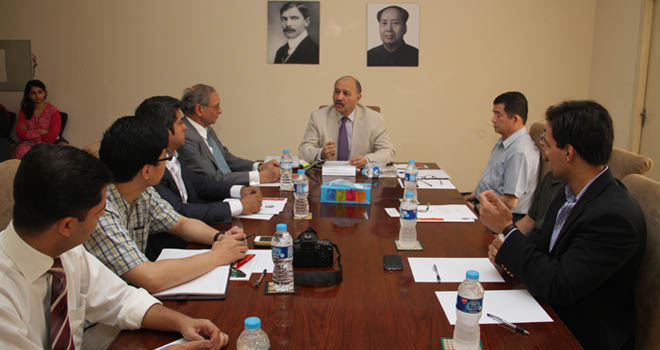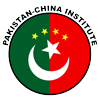PCI hosts briefing on Pakistan-China Prime Ministerial Visits
Date : July 11, 2013
 |
A briefing by Pakistan China institute was held on July 9th 2013, to discuss the recent visits, with Chinese Premier Li Keqiang visiting Pakistan in May, and Prime Minister Nawaz Sharif just having returned from his follow up visit to China. Chairman Pakistan China Institute, Senator Mushahid Hussain gave an enlightening analysis on the significance of these visits and the rise and strengthening of Sino-Pak relations. The briefing was attended by both national and Chinese scholars as well as representatives of local think tanks.
Senator Mushahid Hussain introduced and welcomed the distinguished guests, and began the discussion with explaining the basic purpose which was to have an update on recent important developments in Pak-China relations. He highlighted that Premier Li Keqiang chose South Asia for his first visit, and that Prime Minister Nawaz Sharif also went on his first official visit to China as a follow-up, within 6 weeks. To stress this point further, Senator Mushahid Hussain quoted President Xi Jin Ping, who said that Pakistan was a good neighbor and a good brother; thus emphasizing this ‘all-weather friendship’. He also quoted Premier Li Keqiang, who on his visit to Pakistan said that “If you love China, you love Pakistan too”. Thus the Treaty of Friendship, Cooperation and Good-Neighbourly Relations between China and Pakistan, signed in April 2005, continues to be followed in essence, for according to the Senator “The formulation of China’s relations is not just warm and effusive but substantive as well”.
Discussing the two major aspects of concern between the two countries, Economy and Energy, he said that Pakistan has inextricably linked its economic revival and solving its energy crisis to its relations with China. In this vein, he pointed out the major projects under discussion, the Karachi to Lahore motorway and the Khunjerab-Gwadar-Kashgar rail link. Saying that China had been generous, he then went on to elaborate the unparalleled support Pakistan gives to China, like recognizing the Role of the communist party as a source of strength and support, and support on China’s core interests and issues like Taiwan, Xinjiang and the South China Sea.
The Chairman elaborated the regional significance of Pak-China relations, and their common stance on a wide variety of issues including terrorism, quoting Prime Minister Nawaz Sharif, 'We regard ETIM as our common threat and stand united in combating this menace.' Speaking of Pakistan- China strategic partnership he quoted the joint statement, ‘from maritime cooperation to UN reform to their 'opposition to the weaponisation and an arms race in outer space' and non-discrimination on nuclear issues, both share a convergence of interest on a wide range of issues.’ The regional significance also comes into play with the Afghanistan situation and the Senator commended China’s role and its support for Pakistan's line of ‘inclusive political reconciliation as a key step for peace.'
He then went on to explain the key steps that have to be taken to solve the issues at hand. The first he pointed out was inefficiency, red tape and sluggish bureaucracy which adversely affect implementation, giving Nandipur and Thar coal project as cases in point. To improve this though, he informed that a ministerial level committee had been formed to ensure follow up and implementation.
The second issue he accentuated was the safety and security of Chinese personnel which he said was of paramount importance. The third key issue was the development of an economic corridor. He said that the two aspects of economy and security were interlinked, which is why the concerned areas of Balochistan and Gilgit- Baltistan have to be provided with security and stability. He later recommended that an Industrial Security force could be established which would be assigned to secure and monitor all areas where particularly Chinese projects were in operation. Senator Mushahid ended his briefing reiterating that relations between Pakistan and China had risen to a higher level, and that he looked forward to the relationship becoming stronger.
The floor was then opened for comments and questions by the guests, who lauded Senator Mushahid Hussain for his efforts to bring the two countries close together. Ambassador (retd) Sohail Naqvi said that the fact that the Chinese were resilient and continued their work in Pakistan despite terrorist attacks, had to be lauded. Mr. Abid Imam said that the balance of trade between the two countries ought to improve. Mr. Du from the Chinese Embassy spoke of China’s wish to collaborate with all political parties, and that there ought to be more people to people exchanges, for example, he pointed out that Pakistan has a number of great educational institutions and even more students from China would like to come to Pakistan to study. Professor Zhou Rong emphasized that Chinese language learning ought to be promoted. The briefing thus concluded with a useful discussion on how relations between the two countries could be further improved and how the issues concerning this must be tackled.
